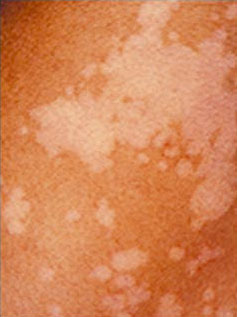|
Intermix.org.uk is a website for the benefit
of mixed-race families, individuals and anyone who feels they have a multiracial
identity and want to join us. Our mission is to offer a view of the mixed-race experience, highlighting icons, film, books, poetry, parenting techniques, celebrities, real lives and much more. Our online forums are a great place to meet others, ask questions, voice your opinions and keep in touch. Sign up for our monthly newsletter and delve into our pages. Want to join in? Become an Intermix member to take part: |
Shifting Clouds (Tinea Versicolour)
 Shifting Clouds and Lhotha are just two of the names given to the light or dark patches that sometimes appear on the skin.
Shifting Clouds and Lhotha are just two of the names given to the light or dark patches that sometimes appear on the skin.
The medical name for this condition is Tinea Versicolor and although this condition can affect people of any race it is often more noticable on people of colour.
The cloud like shapes are a common appearance on mixed-race skin and a visit to the doctor may result in a prescription for Canesten or some other antifungal cream but little information about the condition.
The condition is not contagious, it may recur after treatment, though usually not right away.
There is no permanent skin discolouration, it may take up to several months for the color to even out between skin areas that are affected and not affected. It always eventually does, however.
The rash of tinea versicolor tends to linger even after successful treatment, especially if the spots are lighter than surrounding skin. This persistent discolouration often leads people to think that the fungi are still present long after they have been eradicated. The red or brown variety of rash, on the other hand, usually clear up right away.
It is a good idea to have the condition treated as soon as new spots appear so that any discoloration lasts as short a time as possible.
Recurrence of the rash is all but inevitable, especially in warm humid weather, though it won't recur necessarily every year. Presently there are no known ways to prevent recurrence.
There are several other skin conditions that resemble tinea versicolor:
Pityriasis alba. This is a mild form of eczema seen in young people that produces mild, patchy lightening of the face, shoulders, or torso.
Vitiligo. This condition results in a permanent loss of pigment. Vitiligo is more likely to affect the skin around the eyes and lips, or the knuckles and joints. Spots are porcelain-white and, unlike those of tinea versicolor, are permanent.
If you are worried about a skin condition visit your doctor immediately.
